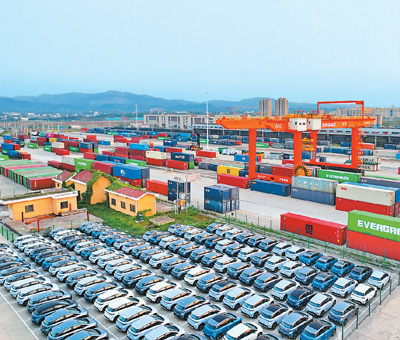Chinese enterprises yield fruitful results in overseas markets
Chinese companies have achieved fruitful results in exporting their products, services, and supply chains, as well as in promoting their brands in overseas markets in recent years.
From Oct. 16 to 20, 2023, over 250 Chinese tech companies participated in "GITEX GLOBAL", one of the world's biggest tech shows, which was held in Dubai, showcasing a dazzling array of products, including Tencent Cloud's application TAMM for public services, Terminus' smart city management system - TACOS, Meituan's M-Drone Gen 4, unmanned driving system of Shanghai Jiyu Technology Co., Ltd., and DEEP Robotics' X30 quadruped robot.
Various types of robots, including delivery, logistics, and patrol robots from Chinese tech companies were also displayed at the event, attracting crowds of visitors.
The export of tech products has become one of the highlights of Chinese companies’ going global in recent years.

A livestreamer of Kilimall, a Chinese e-commerce platform that has set up an overseas warehouse in Africa, introduces commodities during a livestreaming session in Mlolongo, Kenya, Nov. 10, 2023. (Photo/Xinhua)
Vivi He, head of ShineGlobal, an industrial think tank, said that technology has become the core of Chinese companies' global expansion efforts.
"At the current stage, many Chinese companies have already stood out and become global market leaders," said He.
Through technological innovation, financial support and localization, Chinese companies have actively explored the global market and fostered unique competitive advantages in the manufacturing sector represented by smart hardware and automotive, as well as in the digital economy represented by mobile internet, e-commerce, and cloud computing, He added.
In this round of the globalization of the digital economy driven by 5G, AI and other technologies, outstanding Chinese companies have made great progress in intelligentization in areas like autos, home appliances, industrial equipment and software, and have obtained good development opportunities around the world.
Clothes, furniture and home appliances were once the major force behind Chinese exports. Today, their position is gradually being replaced by electric passenger vehicles, lithium batteries and solar batteries.
For example, in the global market, six Chinese battery companies ranked among the top 10 for battery installations during the first five months of this year, with two securing first and second spot on the list, according to SNE Research, an international market research firm.
In terms of software, Chinese companies have been developing in the global mobile app market for years and achieved increasingly impressive results.

A client (left) selects fabric at a booth of an enterprise from China's Shanghai during the 24th China Textile and Apparel Trade Show in New York, the United States, July 19, 2023. (Xinhua/Xie E)
For instance, Chinese app factory Newborn Town, which focuses on overseas emerging markets including the Middle East and Southeast Asia, has formed a differentiated product portfolio with multiple social apps like MICO, YoHo, TopTop and SUGO going viral.
Chinese lifestyles are reaching more and more countries thanks to the global expansion of Chinese companies and their increasing recognition among people worldwide.
New-style tea drinks favored by young Chinese people are becoming increasingly popular in overseas markets. Chinese beverage company Mixue had opened over 1,000 stores in Vietnam and Indonesia respectively by April this year.
Chinese catering brands are also winning over overseas consumers with their dining experiences and quality food and tastes, bringing Chinese flavors to the world. According to incomplete statistics, several Chinese hot pot brands have opened outlets across Europe just this year.
Micro and short dramas and online literature have become popular cultural exports of China. In addition to international versions of Chinese video apps and their overseas social media accounts, Chinese online short drama apps like ReelShort, FlexTV, GoodShort and MoboReels launched by Chinese online literature platforms have contributed to the immense popularity of these micro and short dramas in international markets.
By the end of 2022, the overseas market value of Chinese online literature had exceeded 3 billion yuan (about $421.6 million), and more than 16,000 online literary works had been exported, attracting more than 150 million readers from over 200 countries and regions, according to data from the online literature center of the China Writers Association.
Many Chinese companies have improved product value through more diversified marketing channels and refined operations based on localization.

Chinese electric vehicle manufacturer BYD's new energy vehicles to be exported are parked in an international land port in Ganzhou, east China's Jiangxi Province. (Photo/Zhu Haipeng)
Today, the phrase "Made in China," is associated more with high value-added and premium products like online games, social media apps, livestreaming apps, smartphones, new energy vehicles (NEVs), and innovative medicines.
In the first half of this year, Chinese carmakers exported 2.14 million vehicles, surpassing their Japanese counterparts (2.02 million), according to the China Association of Automobile Manufacturers. It was the first time China had taken the crown as the world's largest car exporter, and Chinese NEVs played a crucial role in this change.
Additionally, 3D scanners and 3D printers from China are dominating the global consumer market. In Amazon's 3D printer category, the top three sellers are all from Shenzhen, south China's Guangdong Province, while Chinese sellers take up nearly 90 percent of the market share.
Customs data shows that from January to June 2023, China exported 1.469 million desktop 3D printers worth nearly 2.2 billion yuan.
China's new infrastructure construction has also been benefiting the world. The BeiDou Navigation Satellite System (BDS) is one such example. "The advantages of the BDS have been recognized worldwide," said Liu Jingnan, an academician with the Chinese Academy of Engineering.
Officially launched on July 31, 2020, the satellite system, as one of four global navigation networks, has provided services for users in over 200 countries and regions around the world. BDS-based services, such as land confirmation, precision agriculture and smart ports, have been successfully applied in ASEAN countries, South Asia, West Asia, Eastern Europe and Africa to serve local economic and social development.
In Kuwait, the BDS assisted Kuwaiti workers in the construction of the 300-meter-tall iconic building of the National Bank of Kuwait to improve accuracy.
In Saudi Arabia, the BDS has been used in gathering geographic information for surveying and mapping, aiding in the development of urban municipal infrastructure, and facilitating personnel and vehicle tracking in the desert.
The BDS brings benefits to people all over the world, and it is a satellite navigation system that belongs to the world, said Awni Al-Khasawneh, the General Secretary of the Arab Union for Astronomy and Space Sciences.
Another example of the global expansion of China's new infrastructure is Chinese enterprises' cloud computing services. Chinese cloud service vendors including Alibaba Cloud, Huawei Cloud, Tencent Cloud, Baidu AI Cloud, and Inspur Cloud have made great strides in international markets. China's cloud computing enterprises have also expanded their presence in Latin America, the Middle East, Africa, Europe and America.
Photos
Related Stories
Copyright © 2023 People's Daily Online. All Rights Reserved.









